Skyping the dog & training in a cupboard - athletes' winter tales
- Published
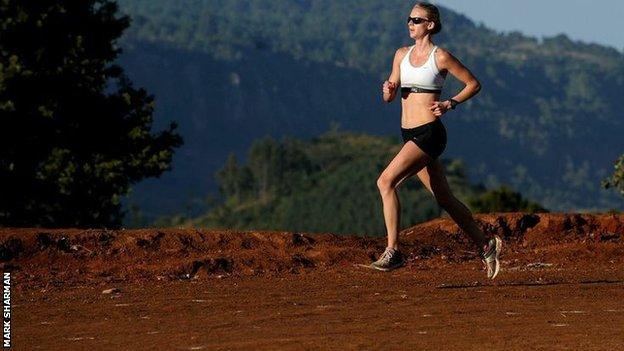
Hannah England spent eight of 12 months in Kenya, attending camps in November and January
Choose darkness. Choose frost. Choose scraping ice and watching your breath freeze. Or choose sunshine and beautiful vistas in far away lands, sweat glistening under the warming rays.
To elite British athletes who commit to the daily grind of eating, running and resting 12 months of the year, the benefits of a winter training camp overseas have been recognised for decades.
But what of the downsides? What is life like thousands of miles from family and friends? And what about those left behind, toiling on home soil?
We talk to those in both camps; to those who follow the sun - Jenny Meadows, the 2011 800m European champion, and world 1500m silver medallist Hannah England - and to stay-in-the-UK mum and European 10,000m champion Jo Pavey.
Lonely days and cabin fever - not even sunshine can stop homesickness
"At the start it feels like you're on a fun school trip, then you realise you've got to do the same thing again and again." Hannah England.
Kenya's Rift Valley - a green and hilly landscape that marathon world record holder Paula Radcliffe describes as inspirational, on whose brutal hills and dirt tracks Mo Farah trained as he rose to greatness.
It was here, 8,000ft above sea level, that Britain's double Olympic and world champion Farah started comprehensive altitude training in 2010 and it is here Britain's finest distance runners test their stamina and souls.
Why run in oxygen-starved air? To produce more oxygen-carrying red blood cells, making running at sea level feel like a breeze, for a short period at least.
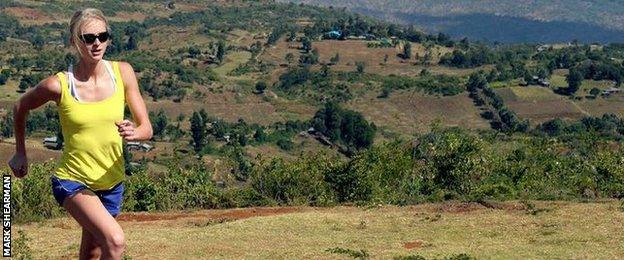
England was one of 17 British athletes to attend a January training camp in Iten
The High Altitude Training Centre, external in Iten has everything an elite athlete needs: sunshine, endless trails, hills, a swimming pool and gym, physiotherapists and psychologists, and the opportunity to watch and learn from Kenya's best.
But the campers aren't always happy. They have to wash their clothes in sinks or buckets - and even the most serene character's equanimity can be tested when solar-powered hot water turns lukewarm, or the electricity cuts out.
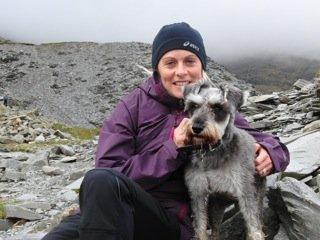
Jenny Meadows with her dog Harvey
"Quite a lot of the boys on our last trip took games consoles with them, but some get bored - you see cabin fever setting in," says England, who shares a room with space for two beds and a desk and not much else.
"Emotionally, I do struggle a lot when I have to go without seeing my husband for a month. Usually there's internet three times a month. I try to Skype my parents but, luckily, I have understanding friends and family."
Four-thousand kilometres away in Potchefstroom in South Africa, Jenny Meadows is also pounding the tracks and pining for home. It can be intense, she admits, and lonely.
"The fourth week, that's when you start to countdown to home time and begin to think about the people you miss," says the British 800m indoor champion, who staves off homesickness with weekly Skype chats with her mum.
"I particularly miss my dog, Harvey, and always feel a bit guilty about leaving him for so long, although he does get spoiled by my mum."
Hallucinating over cheese, South African barbecues and resisting temptation
"There's pizza night every Friday evening, which I live for. People will say it's rubbish pizza, but I don't care." Hannah England
Food glorious food. Three meals a day, prepared by chefs, cooked with organic, home-grown ingredients. But there's a monotony to a catered life. Even world-class engines crave seasoning and spice in their fuel.
"It can be a bit bland," admits the 27-year-old England. "There's very little fat in the diet and you find yourself craving salt. When it comes to pizza night I'm hallucinating over the cheese."
Eating like a king or queen... of the track | |
|---|---|
Breakfast: Eggs, freshly-baked bread and pancakes. | Lunch: Vegetable stew with rice, or lentils and soup. Freshly-baked bread for dunking. |
Dinner: Goat or beef stew with rice or potatoes - or ugali (dough-like consistency made with maize flour). | Treats: Pizza with mince meat, sweetcorn, peppers and cheese topping. |
Meadows, whose trip is funded by businessman and philanthropist Barrie Wells,, external has the freedom to dine in Potchefstroom's restaurants and cafes. A couple of times a week friends will invite her to a braai, a South African barbecue, and there will be occasions when the 33-year-old will give in to temptation.
"I really make a conscious effort to be healthier on camp. However, a few times a week I will have dessert," says Meadows, in the twilight of her career but the form of her life.
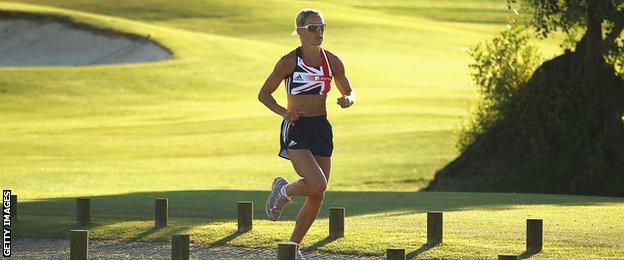
Meadows first went on a training camp to America aged 20, initially only going away in Easter
'Killer' hill sessions in altitude - quivering in apprehension and destroying the soul
"The very nasty killer hill sessions are brutal, but athletes from all over the world have endured the pain." Jenny Meadows
"I've only thrown up once in the last camp," says England, giggling with pride. "I'm a non-responder to altitude. I don't make a lot of red blood cells like other people so I find it really hard when I'm in Kenya.
"Mentally, continually doing things that your mind says is not possible builds resilience. Being a middle-distance runner is about being tough. Going to an extreme environment can benefit me for the rest of the year."
At 4,900ft in South Africa, Meadows starts training at 9.15am and finishes nine hours later, putting herself through track and grass repetition sessions, gym work and dreaded 'killer' sessions. (Anything involving running up and down a 1,000m hill can rightly be associated with murder.)
"Killer sessions make me quiver whenever I see it on my programme," she says. "It's about maximising the hours to not only train, but to do extras, such as stretching and exercises prescribed by the physiotherapist."
A typical day for Meadows in Potchefstroom | ||
|---|---|---|
07:30am - Breakfast. "It's so I can digest before training," says Meadows. | 09:15am - First session of the day which usually lasts two hours. | Noon - Lunch at the apartment and, ideally, a power nap. |
08.15am - Physiotherapy by coach and husband Trevor. | 11.15am - Rehabilitation exercises and ice bath at the High Performance Centre. | 4.30pm - A recovery run of about four to five miles and core exercises. |
Running in the snow, attracting curious looks - always wrapping up warm
"2011 was a bad winter. I'd always wear two pairs of gloves, a headband and a hat, you just get on with it." Jo Pavey
While her British team-mates are waking up to sunshine, Pavey, 41, is enduring the English winter, and attracting curious glances.
"I remember in 2011 there was deep snow everywhere except for one patch of road, amounting to about a two-minute run, which had been treated," says Pavey.
"I had to keep running back and forth on that which meant passing the same bus stop. I've no idea what people thought when they saw me."
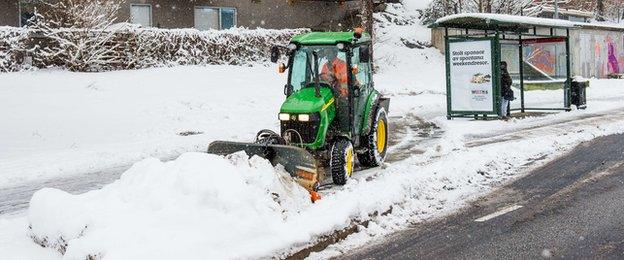
"You can get injured any time of the year but there are precautions you can take in winter," says Pavey
A treadmill in the cupboard, attending children's parties, doing the school run and avoiding illness
"If it's dark I'll run on the treadmill, although it's in a room which is more like a shoe cupboard. It's quite claustrophobic." Jo Pavey
In the winter of 2013, having given birth to her daughter Emily by caesarean, there was no plan for the season ahead.
Jo Pavey wins 10,000m European title at 40
There were dreams of gaining selection for the European Championships and Commonwealth Games, but during those chilly months when Pavey was woken at unwelcoming hours by a baby demanding to be breastfed, aspirations of running on the international stage seemed as fanciful as uninterrupted sleep.
"I wasn't aiming for medals because I didn't think it was realistic," says Pavey, who 11 months after giving birth went on to become the oldest woman to claim gold at a European Championships.
"I didn't think I had a chance of making the British team. I was out of shape for most of the winter and just wanted to enjoy that newborn time."
Twelve months on, a year older, and there are new demands on Pavey.
"I've been invited to things that weren't on the agenda last winter," she says, describing attending Sports Personality of the Year as 'surreal'.
Training - it's a family affair |
|---|
"We might all go to the forest," says Pavey. "Jake will be on his bike and I'll be running. Sometimes we'll all go to the track together, but if it's too cold I'll go on my own. I'm really fortunate that I've been able to have two lovely kids and a supportive husband and feel extremely lucky I've been able to combine athletics with family life. It gives us a lot of quality time together." |
"Each year there are different challenges and now the children are a little bit older it's not just about looking after them, it's about giving them both a nice time, making sure they are socialising.
"Having children means it's harder avoiding illnesses. Both of them have snotty noses at the moment. You just have to chill.
"And mornings are a bit of a panic. I have to give Jacob breakfast, get his uniform and take him to school. Five-year-old boys don't see any urgency in doing anything.
"There's no definite times with training, but I'll always get it done. I have to work around the needs of the children, but one thing about being older is I have experience and can prioritise."
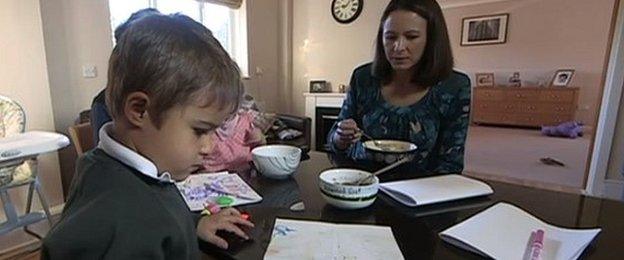
Jo Pavey will have breakfast with her children, Jacob and Emily, before training
Running home or running away? 'It doesn't matter where you do it'
"Training camps helped me. All the things you learn on camp with others enriches your career." Jo Pavey
Pavey hears tales of team-mates running in the Kenyan hills, benefitting from cutting-edge science, and envy bites.
"Before I had children, British Athletics weren't sending athletes to Kenya," she says. "I'd have loved to have gone there and experienced it.
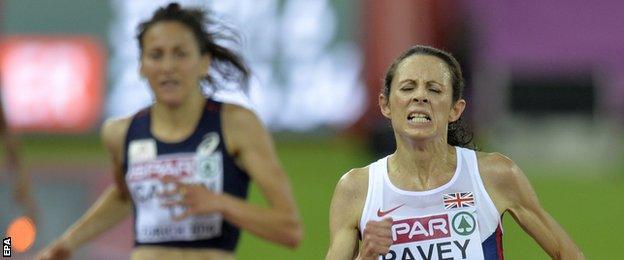
Pavey sprints away from France's Clemence Calvin to win the 10,000m at the European Championships
"I love training in the heat, but you become used to the British winter and get on with it. On the occasions we'd train in altitude in Colorado, it'd be colder than here, freezing and snowing, but you just wrap up.
"When I became a mum and decided I wasn't going to go away anymore, I was worried: would I be able to train in the same way? But it's taught me that winter training is all about being consistent and sensible.
"As long as you're training hard, it doesn't matter where you do it."
Watch live coverage of the Birmingham Indoor Grand Prix on Saturday, 21 February, featuring Mo Farah, Jenny Meadows and Hannah England, on BBC One and online from 13:00 GMT.
- Published12 August 2014
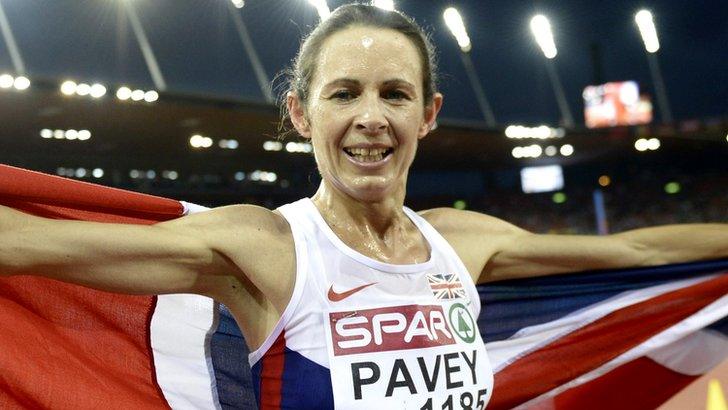
- Published10 September 2015

- Published8 February 2019
